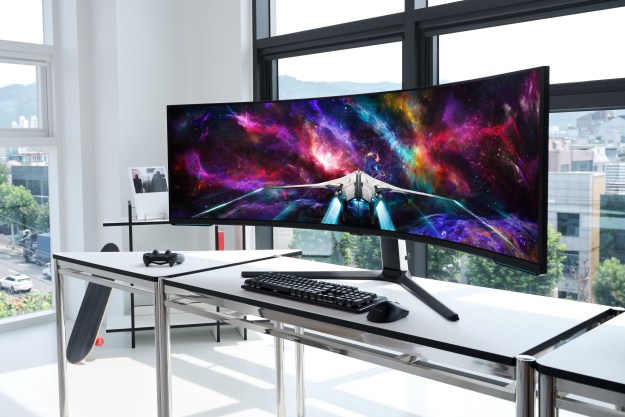 Check out our review of the Panasonic ToughPad FZ-G1 tablet.
Check out our review of the Panasonic ToughPad FZ-G1 tablet.
CES may get its reputation for being all about the common man, hence the consumer part of the Consumer Electronic Show name, but that doesn’t stop companies like Panasonic from using the opportunity to showcase their latest corporate and enterprise products. On Tuesday, Panasonic unleashed two more tablets into their Toughpad line of immortal electronics, one of which is a 10-inch device featuring Windows 8, and the other is a 7-inch featuring Android. The two compliment their recent launch of a 10-inch Android Toughbook late last year.
The first one, above and on the left, is the Toughpad JT-B1, a 7-inch Android tablet running Ice Cream Sandwich (version 4.0.) With a 1.5Ghz dual-core TI OMAP processor, 1 GB of RAM, and 16GB of space, you certainly get plenty of backend hardware for the WSVGA, daylight-readable display. Some interesting hardware also includes an impressive 13-megapixel camera with flash on the back, 1.3-megapixel camera on the front, 5,720mAh user-serviceable battery with 8 hours of life, and optional LTE. The unit comes with a 5-foot drop rating, IP65 rating for dust and water, and operates anywhere from 14 to 122 degrees. Where you choose to read books with this tablet is up to you, but there’s a good chance that it will have a better chance of surviving than you will.
The second new model, in the picture above on the right, is the first Windows 8 tablet by Panasonic, and is the 10.1-inch Toughpad FZ-G1. Featuring a 3rd generation Intel Core i5 processor, up to 256GB SSD, and 8GB of RAM, you’re sure to have plenty of computing power wherever you may go with this Toughpad. It also features a 10.1-inch sunlight-readable display with active digitizer (really just a stylus,) 8 hour battery life, USB 3.0, HDMI, GPS, and also LTE. The FZ-G1 in particular can withstand 4-foot drops, has an IP65 rating for rain and dust, and can operate anywhere from 14 to 122 degrees. As you have probably guessed, it’ll survive anything from construction sites to your three-year-old nephew.
Panasonic has introduced some impressive devices, and these two complete the trinity of Toughpads for those looking for Windows 8 or Android. Sadly there has yet to be any announced pricing, but Panasonic says they’re now available for order, so feel free to drop them a line. You can also watch the video below that they sent us showcasing the tablet trio. No word on Jelly Bean updates for either of the Android tablets.


